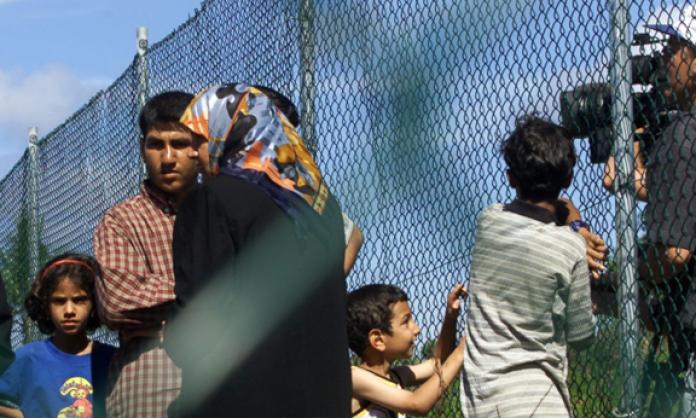Australia’s offshore detention regime is a fortress of secrecy, intimidation and repression. The Guardian’s “Nauru Files” have knocked some of the bricks out of this edifice; what they reveal is horrifying.
The files contain more than 2,000 incident reports involving harm or threatened harm to asylum seekers over a three-year period. They detail what can only be described as systematic torture and abuse:
People humiliated while using the toilets and showers, denied proper medical care, children as young as five assaulted by guards, rampant sexual assault of women and children and a climate of intimidation and fear, which guarantees that the formal reports are, as Save the Children workers have indicated, “just the tip of the iceberg”.
Incidents of people swallowing nails or bleach, or attempting to hang themselves in their accommodation, are frequent. Self-harm and suicide are viewed as among the few means available to assert a sense of control – mothers threatening to walk into the ocean, pregnant women insisting they will cut themselves open if not transported to a safe place in which to give birth. The unspoken dread is illustrated by one report of a child flying into paroxysms of panic upon briefly losing track of their parents’ whereabouts.
But perhaps most distressing about the files is the sense of hopeless despair that breaks the spirit of even those who have managed to survive horrific wars, torture and persecution. Human beings can tolerate terrible adversity so long as there is some real hope of survival and escape. The Australian government denies people on Nauru even that. It is nothing short of astounding that they are able to hold on to any humanity at all in the face of such sadistic treatment.
The government response
Those most responsible for these atrocities remain supremely unmoved. Malcolm Turnbull has not retreated from his assessment of Peter Dutton as an “outstanding immigration minister”. In response to the leaks, he has only reaffirmed his government’s support for the Nauru centre.
Dutton is yet to provide any indication that he experiences human emotion of any sort, least of all empathy with refugees fleeing persecution. His first response was to accuse the detainees of lying about abuse, asserting that “certainly some have made false allegations”. His further suggestion that “people have self-immolated in an effort to get to Australia” displays a degree of callousness that, in any decent society, would immediately mark him out as unfit for public office.
No doubt stiffening Dutton’s resolve are the many trappings of ministerial life. Indeed, in the same month that 100 incident reports were filed on Nauru – including one involving the sexual assault of a woman on a bus by a camp guard and another about repeated child sexual assaults by one guard – Dutton was making headlines for his acquisition of a $2.3 million luxury beachfront property on the Gold Coast’s “Millionaire’s Row”.
Dutton defends his detention regime in the name of protecting borders, criminalising those who don’t respect them (aka people smugglers) and upholding the integrity of the nation state. Increasingly, defending the key institutions of modern capitalism and the authority of those who administer it involves the deployment of extreme violence and repression against society’s most vulnerable, not only in Australia but all around the world. “Order” can be maintained only so long as the powerless are forced to respect the rules of the powerful, and dissent is coopted or crushed.
This is not limited to refugees fleeing imperialist wars and Western-backed dictators. It also applies to Aboriginal people trying to protect their communities against mining companies and developers, workers taking action to improve safety and conditions at work and Muslims simply wanting to practise their religion without being harassed and vilified as terrorists.
It involves the criminalisation of poverty and the unrelenting assault on public services, which abandons the sick and injured to fate. And it manifests in the erosion of democratic rights so as to smooth further the path for big business.
Modern capitalism requires an obscene level of authoritarian repression to survive, whether on the streets of insurgent Aleppo or inside the mass private jails in the United States. And as Dutton demonstrates, those who administer it must be prepared to accept the human cost.
Australia’s shameful treatment of refugees is not simply a moral issue, morally reprehensible though the detention regime is. Nor is it simply a question of human rights, important though they are. At its heart, the treatment of refugees also represents an important contest over what sort of society we live in.
That is a question of power and of in whose interests society is run. The experiment in social organisation based on competitive accumulation of wealth, dictated by market forces, and in which nation states represent these interests within a system of hostile rivalries, has failed.
It has led to a situation where criminals like Turnbull and Dutton not only preside over atrocities but are richly rewarded and venerated for doing so. It has led to a situation where desperate people are brutalised for the crime of being born in a country targeted by imperialist wars or headed up by Western-backed dictators. And it has led to a situation where no-one responsible even pretends to care.
Those of us moved by the Nauru files need to fight for not just the closure of all detention centres, safe passage for every refugee wanting to come to Australia and the scrapping of mandatory detention, but also for a political alternative to capitalism and its destructive logic.









